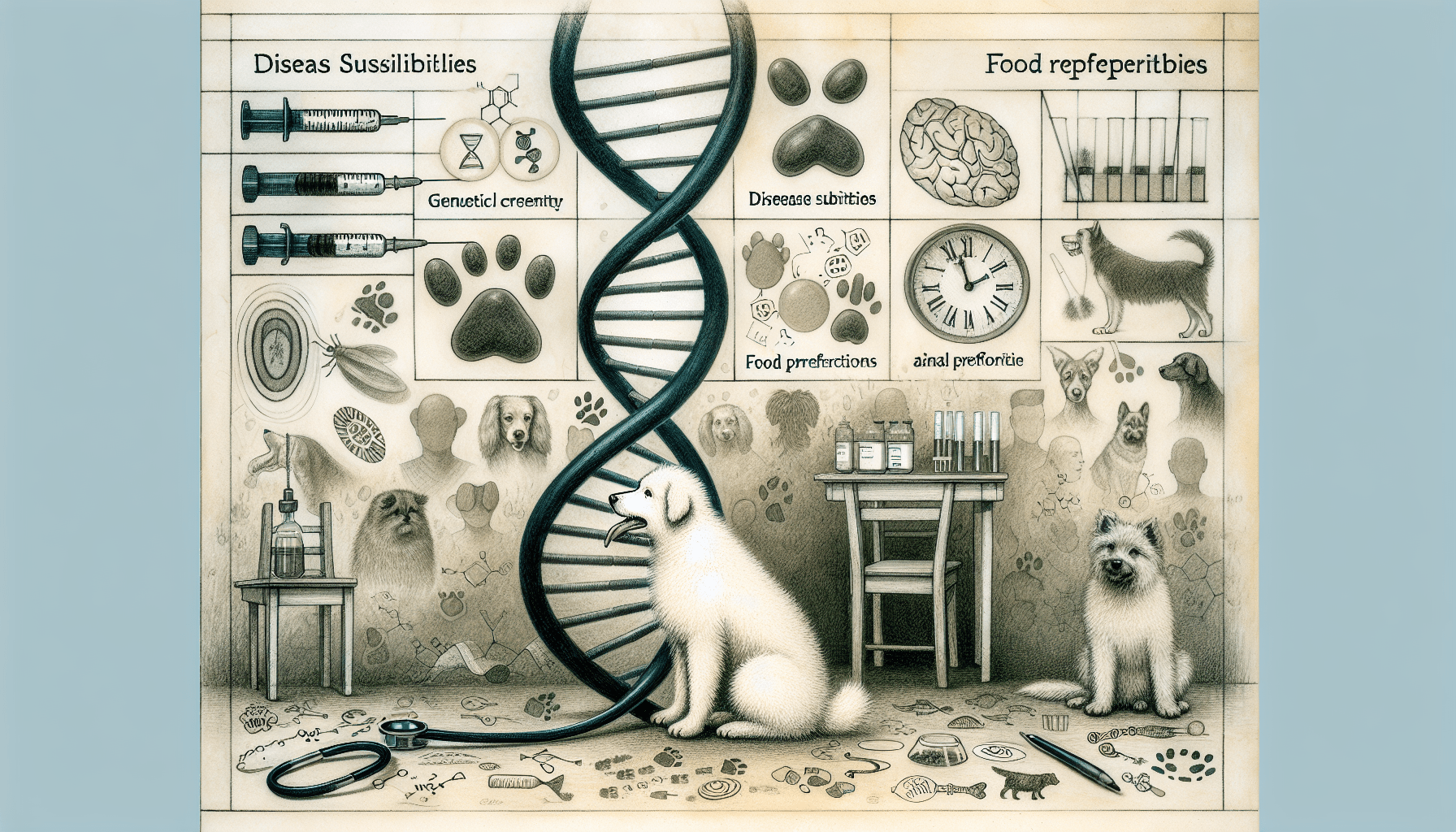Did you know that genetics play a crucial role in determining the health of our beloved pets? Just like humans, our furry companions inherit certain genetic traits that can either predispose them to certain health conditions or give them a greater resilience against diseases. From the color of their fur to their susceptibility to certain illnesses, understanding the role of genetics in your pet’s health can help you provide them with the best care and make informed decisions about their well-being. In this article, we will explore the fascinating world of genetics and how it impacts the health of our four-legged friends. Let’s embark on this enlightening journey together!

Introduction
Welcome to this comprehensive article on the role of genetics in pet health. In this guide, we will explore the various aspects of genetics and how it impacts our furry friends. From understanding basic concepts of genetics to the influence it has on pet health and behavior, we will cover it all. We will also delve into the important topic of breeding and genetics, as well as the benefits and limitations of genetic testing for pets. Finally, we will discuss preventive measures, the role of nutrition, environmental factors, ethical considerations, and future implications. So let’s dive into the fascinating world of genetics and pet health!
Understanding Genetics
Basic Concepts of Genetics
To understand the role of genetics in pet health, it’s important to have a basic understanding of how genes work. Genes are made up of DNA and carry the instructions for various traits, such as coat color, size, and predispositions to certain diseases. Each pet inherits half of their genetic material from their mother and the other half from their father. By studying genetics, veterinarians and researchers can gain insights into the inherited traits and potential health risks of different breeds and individual pets.
Inheritance of Traits
The inheritance of traits from parents to offspring follows certain patterns. Some traits are controlled by a single gene, while others are influenced by multiple genes. Understanding these inheritance patterns can help identify the likelihood of certain traits being passed on to future generations. For example, in dogs, the inheritance of coat color is often determined by two genes, with different combinations leading to different coat colors.
Genetic Mutations
Genetic mutations are changes in the DNA sequence that can occur naturally or as a result of external factors. Some mutations can have detrimental effects on a pet’s health, while others may be benign or even beneficial. For instance, certain mutations in cats can result in unique coat patterns or altered eye colors. However, some mutations can lead to genetic disorders, which we will explore in the next section.
Genetic Disorders
Just as humans can experience genetic disorders, pets can also be affected by inherited conditions. Genetic disorders can range from mild to severe and can impact various aspects of a pet’s health. Some common genetic disorders in dogs include hip dysplasia, which affects the hip joint, and progressive retinal atrophy, which causes vision loss. By understanding the genetic basis of these disorders, veterinarians can provide better care and guidance to pet owners.
Genetics and Pet Health
Influence on Physical Health
Genetics plays a significant role in determining a pet’s physical health. Certain genetic factors can predispose them to specific health conditions, such as heart disease, cancer, or joint problems. For example, large dog breeds are often more susceptible to hip and elbow dysplasia due to their genetic makeup. Knowing the genetic predispositions of a particular breed or individual pet can help veterinarians take proactive measures to prevent the onset or progression of certain diseases.
Impact on Behavior and Temperament
Genetics is not only responsible for a pet’s physical traits but also their behavior and temperament. Certain genes can influence a pet’s personality, energy levels, and predisposition to certain behaviors, such as aggression or anxiety. This knowledge can be crucial in understanding why certain pets may exhibit specific behaviors and help owners provide appropriate training and socialization techniques.
Predicting Health Risks
By understanding the genetics of a particular breed or individual pet, veterinarians can predict potential health risks and provide tailored preventive care. Genetic testing, such as screening for specific mutations or markers associated with certain diseases, can help identify predispositions to conditions like diabetes or certain types of cancer. This information allows veterinarians to develop personalized healthcare plans, including early detection, monitoring, and preventive measures.
Breeding and Genetics
Selective Breeding Practices
Selective breeding is the intentional breeding of animals with desired traits to promote those traits in future generations. When done responsibly, selective breeding can help improve the overall health and quality of a particular breed. By selecting animals with desirable genetic traits and health histories, breeders can minimize the risk of passing on genetic disorders and promote genetic diversity within the breed. Responsible breeding practices ensure that future generations have a reduced likelihood of inheriting genetic disorders.
Breed-Specific Health Concerns
Different breeds have their own unique genetic predispositions to certain health conditions. For example, brachycephalic breeds, such as Bulldogs and Pugs, are more prone to respiratory issues due to their shortened airways. Understanding these breed-specific health concerns can help breeders make informed decisions when selecting breeding pairs and educate potential pet owners about the potential health risks associated with specific breeds. Regular health screenings and genetic testing can aid in early detection of breed-specific health concerns.

Genetic Testing for Pets
Advances in Genetic Testing
Advances in technology have made genetic testing for pets more accessible and comprehensive. Veterinary clinics and specialized laboratories offer a variety of genetic testing options to identify potential health risks and ancestry information for pets. These tests can analyze hundreds of genetic markers and mutations, providing valuable insights into an individual pet’s genetic makeup.
Benefits of Genetic Testing
Genetic testing can provide several benefits for pets and their owners. By identifying genetic mutations or markers associated with certain diseases, owners can take proactive measures to manage or prevent these conditions. Additionally, genetic testing can help identify the ancestry and breed composition of mixed-breed pets, providing a better understanding of their potential health risks and behavioral traits.
Limitations of Genetic Testing
While genetic testing is a valuable tool, it does have limitations. Not all genetic mutations and markers associated with diseases have been identified, making it impossible to provide a complete picture of an individual pet’s health risks. Genetic testing may also produce false-positive or false-negative results, requiring careful interpretation and follow-up testing if necessary. It’s important for pet owners to work closely with their veterinarians to understand the limitations and implications of genetic testing.
Preventive Measures
Understanding Breed-Specific Health Risks
To provide the best possible care for your pet, it’s essential to understand the breed-specific health risks they may face. Familiarize yourself with the common genetic disorders and conditions associated with your pet’s breed, as well as any specific preventive measures recommended by veterinarians. Regular check-ups and health screenings can aid in early detection, intervention, and the development of appropriate preventive care plans.
Early Detection and Intervention
Early detection and intervention are key in managing genetic disorders and preventing their progression. Regular veterinary check-ups, including routine bloodwork and diagnostic tests, can help identify potential health issues before they become severe. Prompt intervention, such as medication, dietary changes, or specialized treatments, can significantly improve the prognosis and quality of life for pets affected by genetic disorders.
Importance of Regular Vet Check-ups
Regular check-ups with a trusted veterinarian are crucial in maintaining your pet’s overall health and detecting any potential genetic health risks. Veterinary professionals have the knowledge and expertise to perform thorough physical examinations, assess your pet’s health history, and recommend appropriate preventive measures. These check-ups also provide an opportunity to discuss any concerns or questions you may have regarding your pet’s genetics and overall well-being.
Nutrition and Genetics
Genetic Influences on Dietary Needs
Genetics plays a role in influencing a pet’s dietary needs and metabolism. Certain genes can impact a pet’s ability to process and digest certain nutrients, such as fats or carbohydrates. By understanding an individual pet’s genetic makeup, veterinarians and pet owners can tailor their diets accordingly. This personalized approach ensures that pets receive the optimal nutrition necessary for their overall health and well-being.
Tailoring Pet Diets Based on Genetic Factors
Genetic testing can provide insights into specific dietary needs and sensitivities that a pet may have based on their genetic makeup. For example, some cats may have a genetic predisposition to develop urinary tract issues, requiring a specialized diet to prevent these problems. By tailoring pet diets based on genetic factors, pet owners can optimize their pet’s nutrition and reduce the risk of developing diet-related health issues.
Environmental Factors and Genetics
Interaction between Genetics and Environment
It’s important to recognize that genetics and the environment interact to influence a pet’s overall health and well-being. While genetics may predispose a pet to certain health risks, environmental factors can either exacerbate or mitigate these risks. Factors such as diet, exercise, living conditions, and exposure to toxins or allergens can impact the expression of certain genetic traits. By providing a healthy and supportive environment, pet owners can optimize their pet’s genetic potential and reduce the susceptibility to certain health conditions.
Identifying Optimal Environmental Conditions
Understanding the genetic makeup of a pet can help identify the optimal environmental conditions for their health and well-being. For example, some dog breeds are more sensitive to extreme temperatures or certain types of exercise due to their genetic traits. By tailoring their living conditions, exercise routines, and overall lifestyle to their genetic predispositions, pet owners can create a suitable environment that promotes their pet’s overall health.
Ethical Considerations
Balancing Genetic Health and Breed Standards
When it comes to breeding practices, ethical considerations play a significant role in balancing genetic health and breed standards. Breeders must prioritize the overall health and well-being of the animals they breed, ensuring they do not perpetuate genetic disorders or conditions that compromise the quality of life. Responsible breeders selectively breed animals with desirable traits while actively working to eliminate harmful genetic disorders from the breed gene pool.
Responsibility of Pet Owners and Breeders
Both pet owners and breeders have a shared responsibility in ensuring the genetic health of pets. Pet owners should be proactive in understanding their pet’s genetic makeup, potential health risks, and take appropriate preventive measures. They should choose reputable breeders who prioritize the health and genetic well-being of their animals. On the other hand, breeders should prioritize ethical breeding practices, including health screenings, genetic testing, and responsible breeding pair selection, to minimize the risk of genetic disorders in their breeding lines.
Future Implications and Research
Advancing Genetic Understanding
As technology continues to advance, our understanding of genetics and its implications for pet health will continue to evolve. Ongoing research and discoveries in the field of genetics are likely to shed more light on the genetic basis of various health conditions, behavior traits, and dietary needs, leading to more precise and personalized pet care.
The Role of Genetics in Personalized Pet Medicine
Genetics has the potential to play a significant role in personalized pet medicine. By gaining a deeper understanding of an individual pet’s genetic makeup, veterinarians can develop personalized treatment plans and preventive care strategies. This approach can improve the accuracy and effectiveness of medical interventions, leading to better health outcomes for pets.
In conclusion, genetics significantly impacts pet health, influencing everything from physical traits to behavior, disease predisposition, and dietary needs. By understanding the basic concepts of genetics, breed-specific health concerns, and the benefits and limitations of genetic testing, pet owners and breeders can make informed decisions to promote the overall well-being of their furry companions. With ongoing research and advancements in genetic understanding, the future holds exciting possibilities for personalized pet medicine. So, cherish your pets and take advantage of our growing knowledge of genetics to give them the best possible care and a happy, healthy life!
